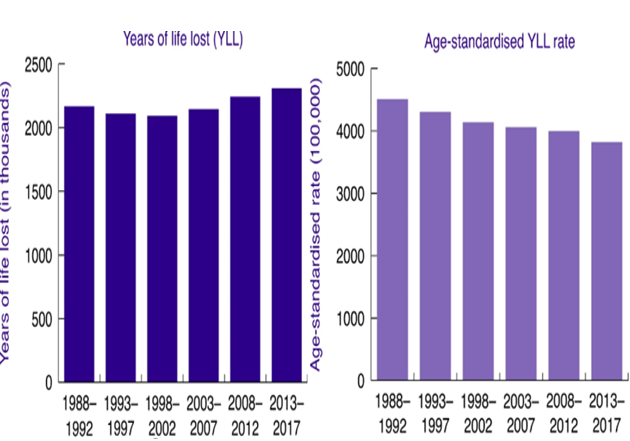2.2 million years of life lost due to cancer each year in the UK
Over two million years of life are lost to cancer in the UK every year, according to a study by authors from WIPH, King’s College London, and Cancer Research UK.

Researchers used the age at death from cancer and average general population life expectancy to estimate years lost to cancer from1988 to 2017. Around a fifth of the total lost years are from lung cancer (more than 500,000 per year), due to the high number of people diagnosed and poor survival. More than 213,000 years of life are lost to bowel cancer each year, and around 197,000 to breast cancer.
For liver, melanoma, and kidney cancers, rates of years of life lost have increased, largely because of increases in numbers of cases. Liver cancer has had the largest increase in rates (157%), associated with increasing prevalence of obesity and alcohol use. For some cancer types rates have fallen. For example, years of life lost to cervical cancer in 1988 were around 43,600, but cervical screening has reduced the number of cases and led to earlier diagnoses, resulting in a reduction to around 21,800 in 2017.
Some cancers, like testicular, contribute a smaller number of lost years overall because they are less common but, on average, people with testicular cancer lose 33 years of life, because it is usually diagnosed in younger people. Other cancer types are more common, but contribute comparatively fewer years of life lost, because they are usually diagnosed in older age or have relatively high survival. Prostate cancer makes up 26% of cases amongst men, but only accounts for 9% of annual years of life lost to cancer.
The data show that although overall numbers of years of life lost per year to all cancers combined has risen since the 1980s (largely due to our growing population), rates have gone down by 15% over the 30-year study period. The biggest decreases in these rates have been in stomach (down by 59%), cervical (down by 58%) and breast cancers (down by 39%).
Judith Offman, Senior Lecturer in cancer prevention and early detection at Queen Mary University of London, said: ‘Measuring years of life lost over a 30-year period provides a different lens to evaluate where health policies and advances in treatment have worked and highlight areas where more needs to be done. Research like this is instrumental in helping leaders in health and politics make the best decisions for patients and their loved ones.’
Ahmad AS, Offman J, Delon C, North BV, Shelton J, Sasieni PD. Years of life lost due to cancer in the United Kingdom from 1988 to 2017. Br J Cancer 2023. doi: 10.1038/s41416-023-02422-8